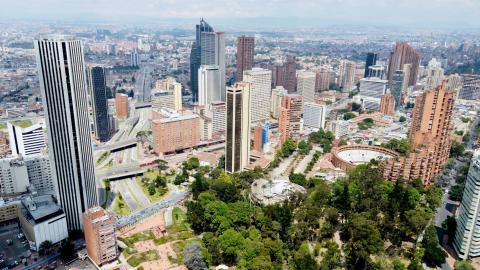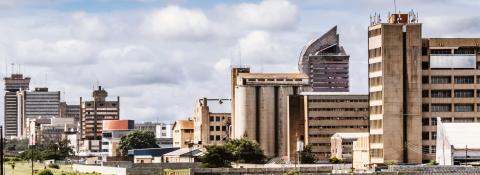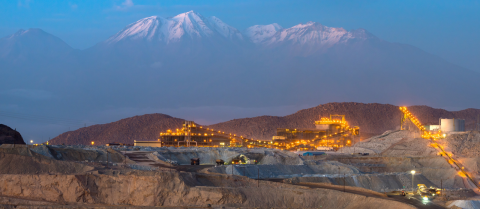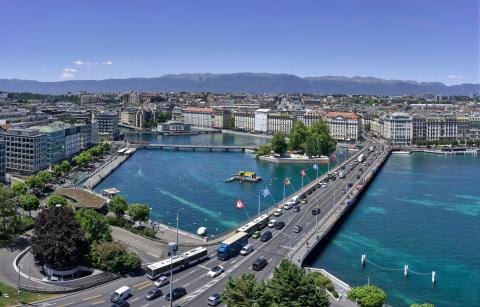
EITI Debates: Challenges and opportunities of social and environmental transparency in Latin America and the Caribbean
Dates: Wendesday 17 and Thursday 18 of November
Time: 09:00 AM (Bogotá) | 16:00 CET (Norway)
Recording Day 1: Transparency and Energy Transition
Recording Day 2: Escazu Agreement and Environmental Rights Defenders
See the Event Detailed Agenda
See Speakers presentations
Why is social and environmental information important in the extractive sector and energy transition?
The EITI Standard seeks to promote open and accountable management of oil, gas and mining resources through multi-stakeholder partnerships. In this framework, several implementing countries in Latin America and the Caribbean have pointed out the importance of increasing transparency in the management of natural resources through the inclusion of environmental and social aspects in the EITI Standard. Knowing the environmental costs involved in the management and use of natural resources along the value chain will make it possible to assess the real public benefit generated for societies.
The demand for social and environmental information is taking place in a particular context of urgency in addressing high environmental risks and climate emergencies, as well as the persistence of environmental conflicts over natural resources in the Latin American region. In this scenario, transparency mechanisms have been adopted as a tool for governance in the management and use of natural resources, so the disclosure of social and environmental information on the extractive sector is essential to promote participation and ensure respect for human rights in favour of a more resilient and sustainable world. This demand has also increased the publication of environmental information in EITI Reports in the LAC Region. To date, all 11 implementing countries have included information on environmental issues in their national reports and workplans.
Find out how the EITI Standard contributes to the disclosure, access and use of social and environmental information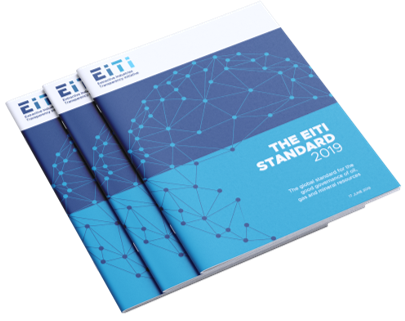
|
Debates EITI: What's missing? Challenges and opportunities for social and environmental transparency in Latin America and the Caribbean
This EITI Debate seek to encourage discussion on the obstacles to the use of environmental information in Latin America and the Caribbean. EITI Debates is an effort by the EITI International Secretariat to deepen understanding and dialogue around the EITI agenda, in order to underpin its implementation in LAC countries.
The EITI LAC team worked together with regional partners (Transparencia por Colombia, DAR Perú, Crudo Transparente, Fundar, OWTU, The Cropper Foundation and Policy Forum Guyana) to organize the virtual event What is missing? Challenges and opportunities of social and environmental transparency in Latin America and the Caribbean. In the event, representatives from Industry, civil society and public institutions of the region shared their reflections related to (1) Environmental Information; (2) Energy Transition; and (3) Environmental Rights Defenders.
The event had simultaneous interpretation in English and Spanish.
Key Messages on Environmental Transparency
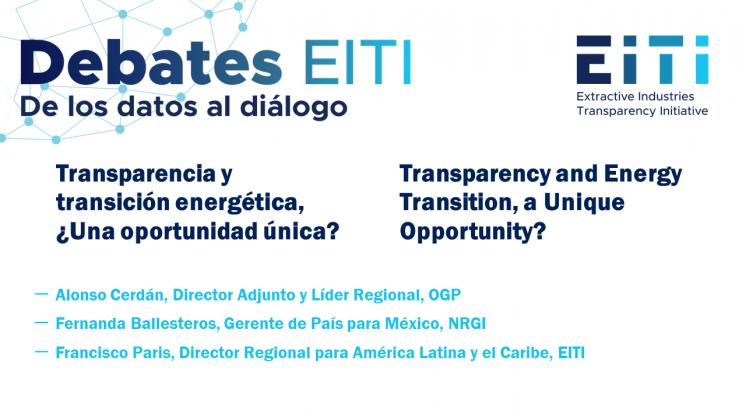
Alonso Cerdan, Americas Deputy Director at the OGP, explained how Perú, Chile, Panama, Ecuador, Mexico and Uruguay are including environmental commitments in the OGP Actions Plans in the LAC Region. He mentioned how OGP and the EITI must work together in the future to improve governance of natural resources in the region.
Fernanda Ballesteros, Country Manager in the NRGI, used the Mexican case to present the Natural Resource Governance Index. She explained other examples of environmental studies (e.g., EITI Shadow Report) using the EITI as a framework. She concluded by highlighting how some EITI Requirements contribute to disclose relevant information for the Energy Transition in the region.
Francisco Paris, Regional Director at the EITI, highlighted the energy transition happening in the region, and the role that hydrocarbons still play in national budgets. He described how OGP works as a platform to articulate the different environmental efforts in the region.
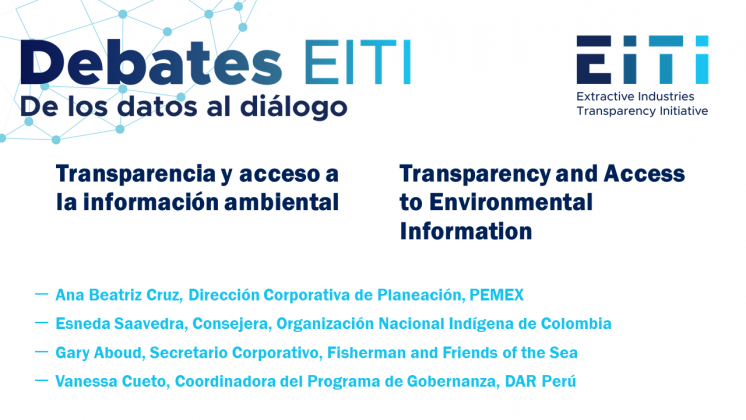
Ana Beatriz Cruz, representative from PEMEX, provided an overview of the transparency policies in PEMEX, and she explained the process to elaborate the Sustainability Report of the Organization and how it is directly related to the Requirement 6.4.
Gary Aboud, Corporate Secretary of Fisherman and Friends of the Sea, talked about the lack of environmental information and corruption in the CARICOM region. He expressed his concern about how the exploitation of natural resources has a business approach that does not represent the best deal for citizens.
Vanessa Cueto, Governance Coordinator at DAR Perú, explained the process of inclusion of environmental information in the EITI Standard, and the role of Civic Society in this process. She detailed the environmental information included in the Peru EITI Report.
Key Messages on Energy Transition
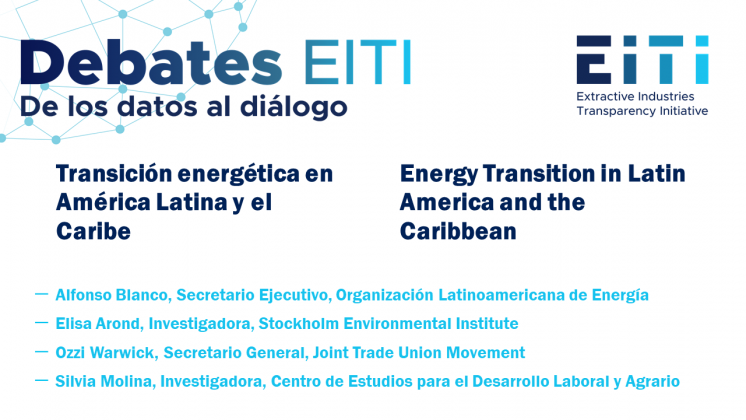
Alfonso Blanco, Executive Secretary at OLADE, explained the energetic balance in the LAC region, and how each country determines their own transition according to their context (availability of resources, technical and political and financial capacities). He presented the results of the renewability index, and the Energy Transition Index. He highlighted the increasing investments in technologies for the energy transition (renewable energies, electrification, and energy storage systems) and the relevance to embed them in national policies.
Elisa Arond, Researcher at the SEI, talked about just energy transitions in the region, and how the EITI should consider the concept of “just” in addressing this issue. She highlighted how the region will be particularly affected due to their dependance of fossil fuels and their relevant production of key minerals. She explained the relevance of transparency and subnational EITI implementation for supporting a just transparency in the energy transition.
Ozzi Warwick, General Secretary at JTUM-OWTU, focused on the relevance of Requirement 7 for energy transition in the CARICOM region. He highlighted how energy transition in the region should be an opportunity for stakeholders to promote a better transition and move beyond simple reporting mechanisms. He mentioned how EITI has deepen transparency in the region and can continue playing a key role in ensuring a fair and progressive transition in the region.
Silvia Molina, Researcher at CEDLA, mentioned that there is no single energy transition and that the decarbonization is not enough to address global warming without addressing the social, economic and territorial inequalities of the current energy model. She highlighted the potential new mining cycle for the supply of critical minerals for the industrialized countries and their national security. Finally, she mentioned the relevance that the systematization of information has for energy transition, which allows assess the information published by companies and government.
Key Messages on The Escazu Agreement
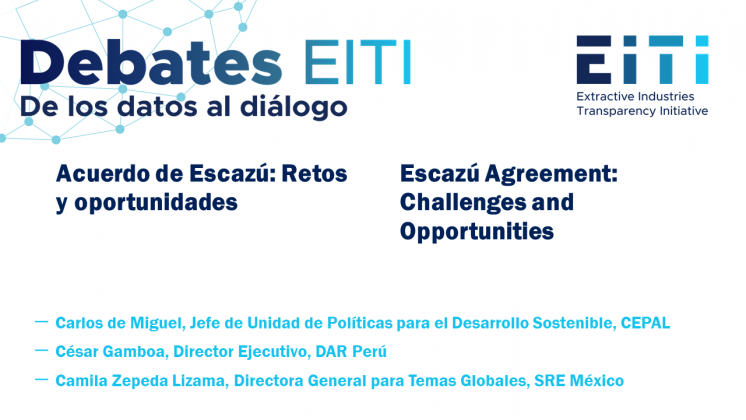
Carlos de Miguel, Head of Policy at ECLAC, focused on the Escazu Agreement and the relevance that transparency has for avoiding environmental conflicts (1/3 of global conflicts are originated in LAC). He explained the correlation that exists between rule of law and violence againt environmental defenders. After mentioning the connections that exists between the EITI Environmental Requirements and the Escazu agreement, Carlos highlighted the synergy that must exists between both initiatives.
César Gamboa, Executive Director at DAR Perú, focused his participation on debunking some myths around the implementation of the Escazu agreement in the region: (1) Escazu is not a replacement of national authorities, (2) it does not take away competencies from national governments regarding environmental management, and (3) it does not provide additional rights to environmental defenders. He highlighted that the Escazu agreement gives content to the EITI Standard by specifying the safeguards, rights, rules and obligations of EITI countries with respect to the Civil Society Protocol and EITI Requirement 1.3.
Camila Zepeda, Head of Global Affairs at the Mexican Ministry of Foreign Affairs, focused on the implementation of the Escazu agreement in Mexico, and how the EITI is helping the Ministry of Foreign Affairs to implement it. She mentioned how Escazu is fostering new processes to review the existing mechanisms for environmental and social justice. After highlighting that the economic grow in the region should not happen at the cost of human rights, Camila stressed how the EITI platform allows the government to have an open communication with civic society, strengthening the transparency.
Key Messages on Environmental Rights Defenders
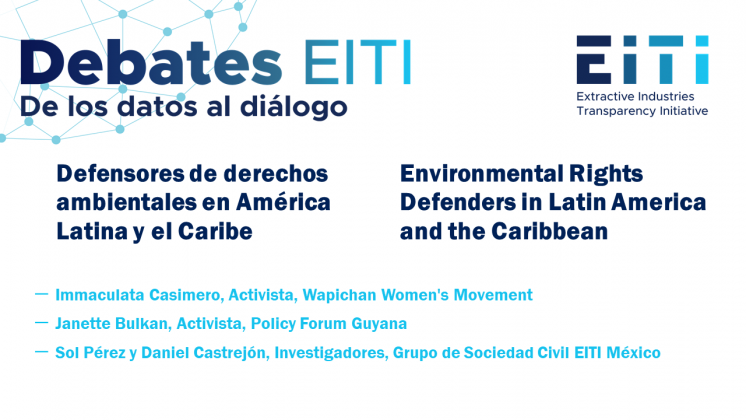
Jeanette Bulkan, Researcher at the University of British Columbia, focused on Environmental defenders in Guyana. She explained that environmental defenders are relevant for the region because (1) government agencies are unable to gather data on environmental damage and (2) public servants are untrained in environmental law. She highlighted the need to train government agencies and affected communities in environmental rights and regulations.
Oscar Daza, An indigenous human rights defender at OPIAC, focused his presentation on the increasing presence of the extractive industries in the Amazon region, and the negative implications for local communities. He described how industrial groups are destroying Colombian amazon region, and those activists trying to defend it. He highlighted how illegal mining activities are increasing in the Amazon region, which is increasing the prevalence of mercury poisoning among children from indigenous communities. He highlighted that there is some progress with policies at an international level, and that the Escazu agreement represents an opportunity to have a more horizontal conversation with government.
Sol Perez and Daniel Castrejon, Researchers and Civic Society Representatives at the EITI Mexico, focused on the implementation of the civic society protocol in Mexico. They described different cases of environmental defenders being attached. To improve the situation of defenders, they recommended to (1) include full participation of environmental defenders in the EITI processes, (2) widen the analysis and use of environmental information produced by the EITI, to make it useful for environmental defenders, (3) strengthen the participation of environmental organization at the subnational level, and to (4) wide the scope of civic society requirements in the EITI validations
Co-organisers:
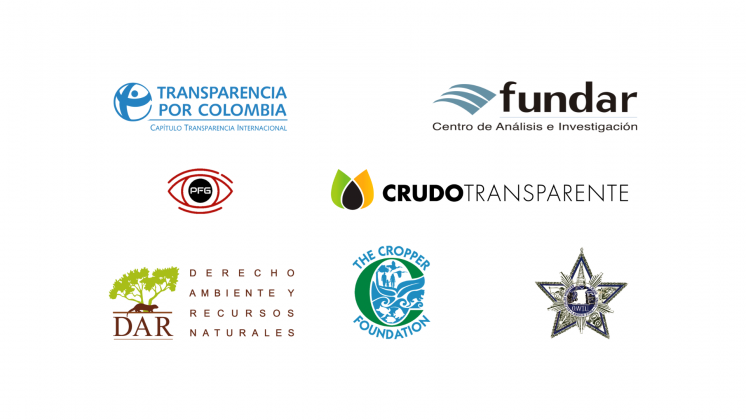
Contenu connexe
